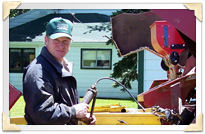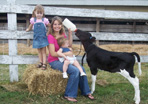Silver Springs, N.Y.

Farm Aid talked with the Klein family, who have been operating Silver Meadows Farm in Silver Springs, N.Y., since 1953. Silver Meadows Farm is a family affair and today there are three generations of Kleins involved in the daily operations.
Q: Tell us a little bit about the story of your family farm.
A: We have been operating as Silver Meadows Farm since 1953, when my husband’s grandparents, John and Bernice Klein, their son, Ronald and his wife, Jackie, bought the farm. It is still family owned and operated. There are three generations of Kleins involved in the daily farm operation: Ron and Jackie, their son, Stan (pictured), myself (Michele), and two of our children, Russell and Colleen. Two other daughters are involved in off-farm activities but they both pitch in to help when they are home visiting.
Q: If we visited your farm today, what would we find growing, grazing or roaming around?
A: The farm is a dairy, milking around 165 Holsteins. We are located on the west side of a pretty little lake, Silver Lake. In total, about 600 acres of farmland are worked. We grow corn, alfalfa, wheat, oats and, for the first time this year, peas. We have a few horses, some sheep, and occasionally, a couple of pigs and assorted poultry. Ron’s wife Jackie raises Pomeranian dogs. In the early spring, we collect sap and boil maple syrup which is sold here at the farm.
Q: Do you have a favorite farm animal?

Klein family, Colleen Reilly and Harley, feeding the calves.
A: Our favorite farm animal has to be our Holstein cows but I personally like goats too.
Q: Describe an average day on Silver Meadows Farm.
A: The farm day begins at about 5am with the morning milking and feeding of the cows and youngstock. My husband Stan and our son, Russ – with the help of two non-family employees – milk, feed and provide health care for the herd. My daughter Colleen and I share the job of raising the baby calves. Colleen also milks on the weekends. The cows are milked twice a day – again at about 4PM. In the spring and summer, crop work occupies much of the rest of the day. During the winter there are always things to fix, meetings to attend and planning to be done. The day usually ends around 7 p.m.
Q: What is your favorite thing about being a farmer?
A: There are many great things about being a farmer: being self-employed, working with animals, spending a lot of time outdoors and especially having an occupation that allows us to be very close with our family.
Q: What is your favorite chore?
A: My favorite chore is feeding the calves with the huge baby bottles.
Q: Why are farmers important?
A: We need to protect our food supply. I want to know where my food was raised and make sure our country’s family farms continue to produce enough to feed us all.
Q: If your farm, and family, had a mission statement, what would it be?
A: Our farm mission statement reflects our beliefs in providing a good living for our family and employees, our commitment to caring for our animals, being good stewards of the land and producing high quality milk. The latter is something that we are very proud of: our milk consistently meets the highest level of quality, which means our co-operative pays us a premium.
Q: Do you have an unofficial farm uniform? Do you ever wear overalls?
A: The most common farm apparel on our farm is jeans. I have a pair of overalls and I love to wear them when it gets hot.
Q: What are some of the biggest challenges you face today as a small dairy producer?
A: One of the biggest challenges we face is finding reliable employees. Dairy farming is a seven-day-a-week business and it is difficult for family members to take a little time off without hiring extra help. Although farms offer competitive wages and benefits, it seems that fewer and fewer individuals are attracted to this type of work. It has also been difficult the past couple of years, financially dealing with low milk prices and the increasing cost of fuel, feed, and insurance.
Q: How has farming changed since you started farming?
A: Technology has changed farming. Records and bookkeeping tasks are done on computer now. The computer hasn’t reduced the amount of time spent keeping records – it probably has increased it, but retrieving information can usually be done quicker. Regulations continue to increase in every aspect of farming from nutrient application to labor laws, etc. In addition to caring for the animals and the land it is absolutely necessary to keep on top of the regulations. It is very important for the farming community to maintain good relations with our non-farm neighbors. We need to tell them what farming is all about and listen to their concerns. Some people today have very little idea where their food comes from and how it is produced.
Q: Do you think your family will stay on the farm?
A: My husband, Stan, has always wanted to be a farmer. I think our son has probably felt that way as well. After high school he enlisted in the Marine Reserves and then studied agriculture at Cornell University. His degree took a little longer to earn, as his Senior year in college was interrupted by a seven month tour of duty in Iraq. Our daughter, Colleen, has always loved working with the cows. She went to school and worked off farm for a few years but has found that she can fit in some farm chores and be a stay at home mom as well. She is planning to go back to college this fall and earn a degree in Animal Science.
Q: After watching two of your children choose work on the farm, do you have any advice for young people that want to get into farming?
A: For the younger generation, I think the time involved in working on and owning a family farm makes the decision to do it more difficult. If someone is interested in getting into farming they should most certainly work on a farm for a period of time first, get some agricultural education and ask a lot of questions!
Q: Over the next twenty years, what is your vision for Silver Meadows Farm?
A: I would like to see our farm continue to provide a viable living for our children and their children. This is a disappearing lifestyle. It is a good way to raise a family. Farming is not all toil and dirt. It is also baby calves, finding new kittens, beautiful scenery, good farm smells and the feeling at the end of the day that something good has been accomplished.
After speaking with Michelle, it was clear that having multiple generations working on Silver Meadows Farm is a core part of what makes it a special place. To get a little insight into the rest of the family, we also asked Michelle’s daughter, Colleen, to share some of her thoughts about raising a family on the farm.
Q: What is your favorite thing about being a farmer?
A: The best thing about being a farmer is being able to spend a lot of time with your family. Our family farm has allowed me to leave the traditional working environment and stay at home with our two young children. I work on the farm as a relief milker on the weekends and feed calves early morning hours during the week. It is very satisfying to stay at home with my children and make a contribution to the farm at the same time.
Q: Why do you think farmers are important?
A: Farmers are essential to providing the food products our country consumes everyday. In addition, it is the farmers responsibility to provide a positive example of land use and practices. Farmers also play an important role in educating the public about how their food is produced.
Q: Over the next twenty years, what is your vision for Silver Meadows Farm?
A: In twenty years, I see the farm growing to comfortably be able to support all our family members while maintaining a successful coexistence with our non-farming neighbors. In doing so I hope to incorporate new practices while preserving our traditional family methods and values.
Date: 7/19/2007


